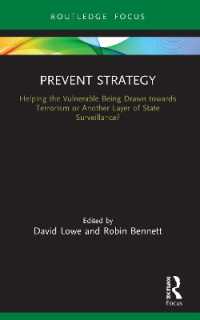- ホーム
- > 洋書
- > 英文書
- > Nature / Ecology
Full Description
In this book Christopher Shaw analyses how liberalism has shaped our understanding of climate change and how liberalism is legitimated in the face of a crisis for which liberalism has no answers.
The language and symbolism we use to make sense of climate change arose in the post-World War II liberal institutions of the West. This language and symbolism, in neutralising the philosophical and ideological challenge climate change poses to the legitimacy of free market liberalism, has also closed off the possibility of imagining a different kind of future for humanity. The book is structured around a repurposing of the 'guardrail' concept, commonly used in climate science narratives to communicate the boundary between safe and dangerous climate change. Five discursive 'guardrails' are identified, which define a boundary between safe and dangerous ideas about how to respond to climate change. The theoretical treatment of these issues is complemented with data from interviews with opinion-formers, decision-makers and campaigners, exploring what models of human nature and political possibilities guide their approach to the politics of climate change governance.
This book will be of great interest to students and scholars of climate change, liberal politics, environmental communication and environmental politics and philosophy, in general.
Contents
Acknowledgments
Preface
Introduction
Five liberal climate guardrails
The liberal language of climate change
Definitions of liberalism
Geographical focus
Why liberalism's time is up on climate change
The structure of this book
Conclusion
Chapter 1. The struggles of climate liberalism
1.1 Sublimating paradox
1.2 The best of all possible worlds, the worst of all possible worlds
1.3 Freedom from, or freedom to?
1.4 Anarchy and order
1.5 Openness to new ideas vs the reproduction of liberalism
1.6 The five liberal climate guardrails
1.7 Conclusion
Chapter 2: Climate change is not a challenge to individualism.
2.1 A visit to the circus
2.2 Creating the climate individual
2.3 The search for individual free will
2.4 Hegemonic climate communication
2.5 Conclusion
Chapter 3. The liberal construction of climate change is universally relevant.
3.1 Guardrail 2: The liberal construction of climate change is universally relevant.
3.2 Institutional norms and the liberal imperialism of climate change
3.3 The communication of liberal institutional norms in climate discourses
3.4 Climate targets and the communication of liberal norms
3.5 The denial of uncertainty and the denial of climate justice
3.6 Local experiences of a global phenomenon
3.7 Conclusion
Chapter 4: Climate change is not an historical phenomenon.
4.1 Removing history from the climate debate
4.2 De-historicising the transformation
4.3 Removing the working class from the transformation
4.4 Intellectuals and the de-historicising of climate change
4.5 Living with the past
4.6 Conclusion
Chapter 5. Guardrail 4: Climate change will be solved through technological innovation.
5.1 Substituting technology for progress
5.2 Science against democracy
5.3 Selling technological responses to climate change
5.4 Conclusion
Chapter 6: Climate Guardrail 5: Sustainable lifestyles will emerge from the appropriate cultural cues and leadership.
6.1: Stories, myths and other fairy tales
6.2 Can new stories create new worlds?
6.3 Culture as control
6.4 Creating orderly transitions through stories
6.5 Eden 2.0: Climate Change and the Search for a 21st Century Myth.
6.6 What We Think About When We Try Not to Think about Global Warming: Toward a New Psychology of Climate Action.
6.7 Conclusion
Chapter 7: Maybe tomorrow
7.1 Interview methodology
7.2 Results from the interview analysis
7.2.1 Freely choosing a future of fewer freedoms
7.2.2 The individual's role in creating the conditions for a system of fossil fuel free exploitation
7.2.3. Searching for mushrooms
7.2.4 Keep your head down whilst waiting for the change to come
7.2.5. Substituting politics with science and technology
7.2.6 Talking climate
7.2.7 So much to do, such little time
7.2.8 Waiting for politicians
7.2.9 What's the problem?
7.2.10 It's not just the climate
7.3 Conclusion
Chapter 8: Conclusion: What future?
8.1 Is there a there there?
8.2 The limits of the individual in a world of limits
8.3 You shall have no other gods but science
8.4 We can't do this on our own
8.5 A peasant prospect
Index








